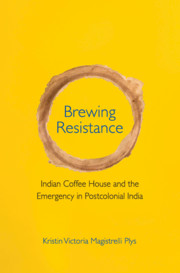Book contents
- Frontmatter
- Contents
- Acknowledgements
- 1 Introduction
- 2 How Anti-Colonial Labour Movements Create Anti-Authoritarian Autonomous Zones
- 3 Indira Gandhi’s Political Economy of Development
- 4 Social Movements of the 1970s
- 5 Emergency at Midnight
- 6 The Coffee House Movement
- 7 ‘Coffee House’ Workers’ Anti-Colonial Labour Movement
- 8 Conclusion
- Appendix I Photographs
- Appendix II Political Parties during the Emergency
- Appendix III Methodological Appendix
- Bibliography
- Index
Appendix III - Methodological Appendix
Published online by Cambridge University Press: 12 May 2020
- Frontmatter
- Contents
- Acknowledgements
- 1 Introduction
- 2 How Anti-Colonial Labour Movements Create Anti-Authoritarian Autonomous Zones
- 3 Indira Gandhi’s Political Economy of Development
- 4 Social Movements of the 1970s
- 5 Emergency at Midnight
- 6 The Coffee House Movement
- 7 ‘Coffee House’ Workers’ Anti-Colonial Labour Movement
- 8 Conclusion
- Appendix I Photographs
- Appendix II Political Parties during the Emergency
- Appendix III Methodological Appendix
- Bibliography
- Index
Summary
For this book, I constructed an original database based on archival sources and oral history interviews collected from 2012 through 2018. I spent two years in India doing archival research and oral history interviews, a little less than a year in Berlin, and three months in London doing archival research. In London, I utilised the India Office Library at the British Library to detail the colonial origins of Indian Coffee House, along with the global politico-economic context in which it was created. In Berlin, I looked to the archives at the Zentrum Moderner Orient. In India, I have worked in various archives across the country in order to research India's anti-colonial labour movement, of which the Indian Coffee House workers were a part, along with the political economy of postcolonial India from 1947 to 1977. I spent considerable time at the larger archives including the National Archives of India and the Nehru Memorial Museum and Library but have also made use of smaller and regional archives. In New Delhi, these include the V. V. Giri Archives on Indian Labour, the P. C. Joshi Archives on Contemporary History at Jawaharlal Nehru University, the Central Secretariat Library, and the Delhi Archives. I have also conducted archival research outside of Delhi, including in the Punjab State Archives in Chandigarh, Haryana State Archives in Panchkula, the K. N. Raj Memorial Library, and Kerala State Archives, both in Thiruvanathapuram.
Archives
At the British Library in London, I used the India Office Library's collection in order to research the colonial origins of the firm, Coffee House. I relied on the founding documents of the firm, reports detailing its growth and diffusion, and statistical series on the Coffee Houses along with statistical series on the coffee sector in colonial India. I also found key information about the larger political economy of coffee in the British Empire, including files on the commodity surplus crisis in the 1930s and 1940s, files detailing inter-empire competition within the coffee sector, and intelligence reports on the Communist Party of India, which organised the Coffee House workers.
- Type
- Chapter
- Information
- Brewing ResistanceIndian Coffee House and the Emergency in Postcolonial India, pp. 308 - 318Publisher: Cambridge University PressPrint publication year: 2020



